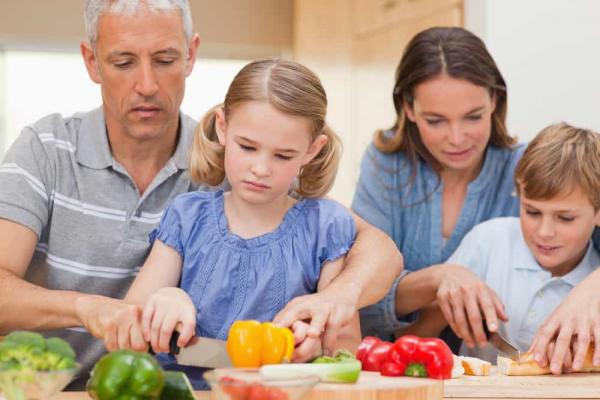
Cooking is a necessity. Cooking is a chore. Cooking is an art form. But most importantly, cooking is something that can easily be transformed into a cherished family tradition that is jam-packed with fun, creativity and memories. This is why teaching your child how to cook will not only prepare them for life physically and mentally, but also emotionally and even socially.
To help you make the most out of your kids' culinary experience, here are 10 simple tips.
Keep it safe
Safety should be of the utmost importance when teaching your child to cook. Teach that only an adult is allowed to use knives, scissors or other sharp objects. Make sure they understand that some foods and objects may get very hot and can cause burns if not handled correctly. Utilize proper safety equipment like hot pads or utensils. And be careful about what chair or stepping stool you allow your child to stand on.
Keep it clean
Teaching good hygiene practices is very important when cooking as it can prevent the spread of germs. Show your child to wash their hands with soap and warm water for at least 20 seconds (maybe teach them a hand washing song to make it more fun). Discourage "double dipping" (tasting something then putting the utensil used to taste back in the food) when cooking for others.
Keep it age appropriate
If you are teaching a toddler or a very young child to cook, select simple recipes with easy-to-use ingredients such as peanut butter and jelly sandwiches. As the child gains experience and grows older, increase the difficulty level.
Keep it tasty
Look for recipes for dishes that are healthful but also something your child will like. Your child will not enjoy cooking something that they won't also enjoy eating later!
Keep it new
Never cease to experiment with new ingredients and recipes. Variety keeps cooking eternally fresh and interesting while at the same time expanding your child's palate.
Keep it educational
Teach your child tasks like how to read recipes, properly measure ingredients, and use various utensils. Teach them what foods are healthful for their bodies and why. As they get older, teach them how to double or halve recipes.
Keep it fun
Purchase cooking items that are just for your child's use such as an apron, a chef's hat, measuring spoons and utensils. This makes the experience personal and extra special.
Keep it messy
Although it is important to teach your child to clean up as they cook, your child is still a child and that equates to messes! Expect eggs bursting when they hit the floor, flour to poof into the air and little fingers to get sticky. Then embrace it as these mishaps create timeless memories.
Keep it involved
In addition to keeping your child busy with the actual prep and cook work, keep them involved in the list-making and grocery shopping. Have them help you decide what ingredients you need for a specific recipe and write out a shopping list (and enjoy the smiles of other shoppers as you try to read the wrinkled, crayon-written list at the store). And teach them things like how to select ripe produce and quality ingredients.
Keep it memorable
Keep a camera (waterproof if you can afford it!) nearby in the kitchen. Capture both posed and candid moments as you and your child make priceless family memories together.

